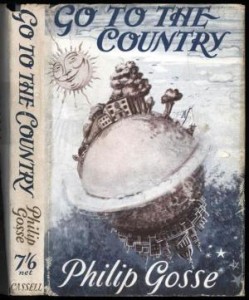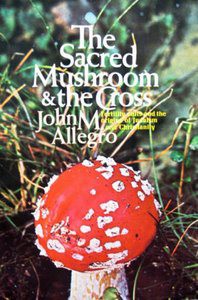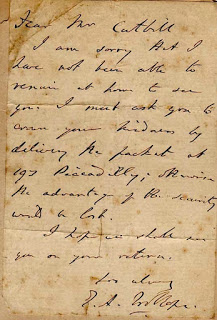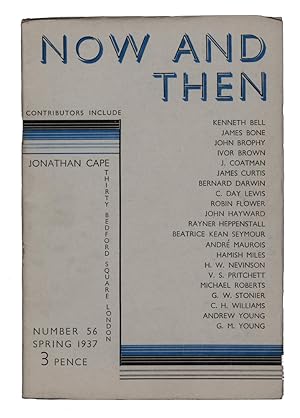
This was a literary magazine published sporadically by Jonathan Cape to promote their own new books.
The idea of such a magazine is unusual, to say the least. Your Jotter is not familiar with any other periodical of this type ( though doubtless there must be one or two) , and it is certainly sneaky to design a magazine to look almost exactly like an independent literary review, rather than a book promotion. The name of the publisher does appear on the cover of the Winter 1936 issue, which we found in our archive at Jot HQ, and in the case of The Book of Margery Kempe, the name ‘ Jonathan Cape’ appears under the blurb in an advertising panel in this issue , but in every other advert in the magazine the publisher’s name is absent, as indeed it is in every review of the books. This is surely misleading to everyone reading the magazine except those who were familiar with it and its aims. A casual reader picking up a copy of Now and Then from a bookstall back in 1936 would conclude that here was yet another literary review and only on close inspection would he or she perhaps be suspicious of its independence. The inclusion of the words ‘Jonathan Cape’ on every advert and in every review would have immediately given the game away. However, any reader sufficiently impressed by a review to seek out the books in a store might easily be offended at being taken in by a blatant piece of puffery. I wonder if Jonathan Cape lost any customers this way. Few would have expected a reputable and long established publisher, such as John Murray, to indulge in such chicanery. But the comparatively recently founded Jonathan Cape, which had begun in 1921, was evidently keen to boost its sales.
The trick, which probably began in the company’s marketing department, originated with the first issue of Now and Then in the 1920s, but was further enhanced in the ‘thirties when it adopted the art deco cover style of Geoffrey Grigson’s New Verse, with its trendy sans serif font. Up to this point Now and Then had used the conventional roman font for its cover. However, the main text and back cover remained resolutely Roman throughout its existence.
To their credit, the people at Jonathan Cape did not choose many of their own authors as reviewers. In this Winter 1936 issue, only Muriel Stuart could be classed as such. Most of the others were under fifty, although there were few older , well-known authors , such as Winston Churchill, William Beach Thomas and Grant Richards. Most were well known literary figures , although one or two, such as short story writer and novelist L. A. Pavey, James Curtis, a screenwriter and novelist, best known for ‘They Drive by Night’, and Muriel Stuart, a poet and writer on gardening, were less eminent.
Continue reading
 Part one
Part one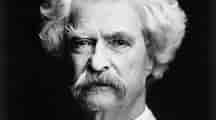
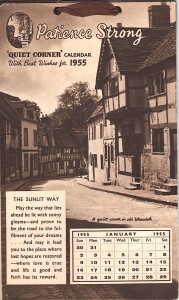 Found amongst a pile of books at Jot HQ, the pocket-sized ‘Patience Strong ‘Quiet Corner ‘calendar for 1955 with its sepia photographs of ‘ picturesque ‘ spots in England. We had almost forgotten that publishers still used sepia photographs as late as this, but then remembered the lifeless and dispiriting photographs of landscapes and empty streets in Arthur Mee’s ‘King’s England’ series of county guide books. No wonder the county guides published by Shell from 1934 were regarded as such a welcome change from these dreary volumes. Mee’s totally predictable descriptions of towns and villages in each county were matched by Strong’s trite and cliché-ridden verse formatted as prose in her calendar and exemplified in ‘ The Sunlit Way ‘which accompanied a traffic-free photo of a ‘ quiet corner of old Warwick ‘ on the page for January 1955.
Found amongst a pile of books at Jot HQ, the pocket-sized ‘Patience Strong ‘Quiet Corner ‘calendar for 1955 with its sepia photographs of ‘ picturesque ‘ spots in England. We had almost forgotten that publishers still used sepia photographs as late as this, but then remembered the lifeless and dispiriting photographs of landscapes and empty streets in Arthur Mee’s ‘King’s England’ series of county guide books. No wonder the county guides published by Shell from 1934 were regarded as such a welcome change from these dreary volumes. Mee’s totally predictable descriptions of towns and villages in each county were matched by Strong’s trite and cliché-ridden verse formatted as prose in her calendar and exemplified in ‘ The Sunlit Way ‘which accompanied a traffic-free photo of a ‘ quiet corner of old Warwick ‘ on the page for January 1955.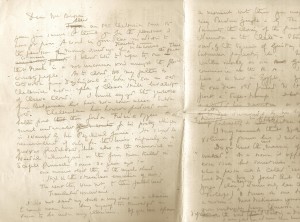 Found in a pile of papers around a year ago at Jot HQ is this draft of a barely decipherable ( hence the gaps and possible misreadings of words ) and incomplete letter written in pencil on the back of a typed Roneoed page headed ‘ The Association of British Chambers of Commerce/5thOctober, 1942/Parliamentary Bulletin No 462A/Information by question and answer. The draft letter is addressed to ( Ivor ) Brown, author of A Word in your Ear( 1942), a book that explores the history of certain words. The writer cannot be identified from any clues in the letter , though what clues there are might open up paths for Jot fans who are familiar with Cheltenham and the Cotswolds. Any with information are welcome to write in.
Found in a pile of papers around a year ago at Jot HQ is this draft of a barely decipherable ( hence the gaps and possible misreadings of words ) and incomplete letter written in pencil on the back of a typed Roneoed page headed ‘ The Association of British Chambers of Commerce/5thOctober, 1942/Parliamentary Bulletin No 462A/Information by question and answer. The draft letter is addressed to ( Ivor ) Brown, author of A Word in your Ear( 1942), a book that explores the history of certain words. The writer cannot be identified from any clues in the letter , though what clues there are might open up paths for Jot fans who are familiar with Cheltenham and the Cotswolds. Any with information are welcome to write in.